
The North Pole, also known as the Geographic North Pole, Terrestrial North Pole or 90th Parallel North, is the point in the Northern Hemisphere where the Earth's axis of rotation meets its surface. It is called the True North Pole to distinguish from the Magnetic North Pole.
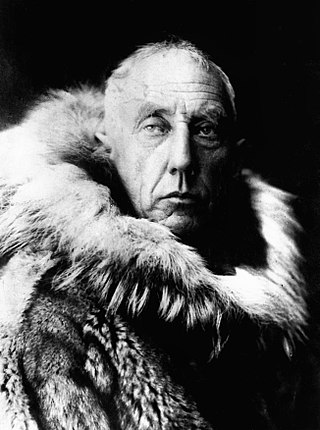
Roald Engelbregt Gravning Amundsen was a Norwegian explorer of polar regions. He was a key figure of the period known as the Heroic Age of Antarctic Exploration.
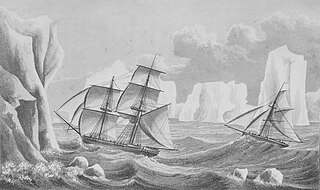
The history of Antarctica emerges from early Western theories of a vast continent, known as Terra Australis, believed to exist in the far south of the globe. The term Antarctic, referring to the opposite of the Arctic Circle, was coined by Marinus of Tyre in the 2nd century AD.

Robert Edwin Peary Sr. was an American explorer and officer in the United States Navy who made several expeditions to the Arctic in the late 19th and early 20th centuries. He is best known for, in April 1909, leading an expedition that claimed to be the first to have reached the geographic North Pole.

Fram ("Forward") is a ship that was used in expeditions of the Arctic and Antarctic regions by the Norwegian explorers Fridtjof Nansen, Otto Sverdrup, Oscar Wisting, and Roald Amundsen between 1893 and 1912. It was designed and built by the Scottish-Norwegian shipwright Colin Archer for Fridtjof Nansen's 1893 Arctic expedition in which the plan was to freeze Fram into the Arctic ice sheet and float with it over the North Pole.
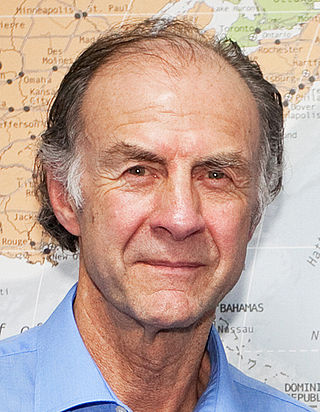
Sir Ranulph Twisleton-Wykeham-Fiennes, 3rd Baronet, commonly known as Sir Ranulph Fiennes and sometimes as Ran Fiennes, is a British explorer, writer and poet, who holds several endurance records.

Matthew Alexander Henson was an African American explorer who accompanied Robert Peary on seven voyages to the Arctic over a period of nearly 23 years. They spent a total of 18 years on expeditions together. He is best known for his participation in the 1908–1909 expedition that claimed to have reached the geographic North Pole on April 6, 1909. Henson said he was the first of their party to reach the North Pole.
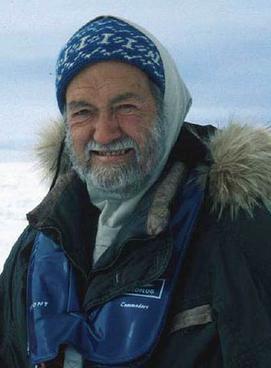
Sir Walter William Herbert was a British polar explorer, writer and artist. In 1969 he became the first man fully recognized for walking to the North Pole, on the 60th anniversary of Robert Peary's disputed expedition. He was described by Sir Ranulph Fiennes as "the greatest polar explorer of our time".
Paul Landry M.B. is a French-Canadian polar explorer, author, and adventurer who is the only paid man to ever reach three Geographical poles in a single year.

Sir James Clark Ross was a British Royal Navy officer and polar explorer known for his explorations of the Arctic, participating in two expeditions led by his uncle John Ross, and four led by William Edward Parry, and, in particular, for his own Antarctic expedition from 1839 to 1843.
Benjamin John Saunders is an English polar explorer, endurance athlete, and motivational speaker. He led the first return journey to the South Pole on foot via Shackleton and Scott's route in 2013–14, and skied solo to the North Pole in 2004. Saunders has skied more than 3,700 miles (6,000 km) on polar expeditions since 2001. He holds the record for the longest human-powered polar journey in history (2,888 km) and for the longest solo Arctic journey by a Briton (1,032 km).
Rupert Nigel Pendrill Hadow known as Pen Hadow, is an Arctic region explorer, advocate, adventurer and guide. He is the only person to have trekked solo, and without resupply by third parties, from Canada to the Geographic North Pole.

Nobu Shirase was a Japanese army officer and explorer. He led the first Japanese Antarctic Expedition, 1910–12, which reached a southern latitude of 80°5′, and made the first landing on the coast of King Edward VII Land.

The South Pole, also known as the Geographic South Pole, Terrestrial South Pole or 90th Parallel South, is the southernmost point on Earth and lies antipodally on the opposite side of Earth from the North Pole, at a distance of 12,430 miles in all directions. It is one of the two points where Earth's axis of rotation intersects its surface.

Thomas Avery, FRGS is a British explorer, author and motivational speaker. He made record-breaking journeys to the South Pole in 2002 and to the North Pole in 2005. He is one of fewer than ten people throughout history to have completed the Polar Trilogy; full length expeditions to the South Pole and North Pole and a coast to coast crossing of Greenland. Avery and his teammates hold two Guinness World Records; the fastest surface journey to the North Pole and the fastest coast-to-coast crossing of Greenland. He is also the youngest Briton to have reached both the North and South Poles on foot.
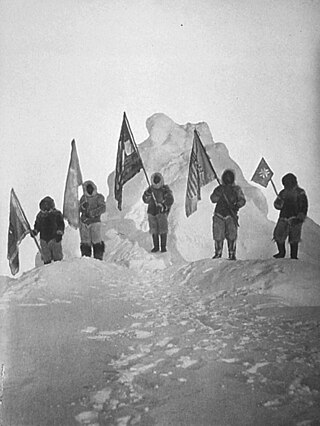
Polar exploration is the process of exploration of the polar regions of Earth – the Arctic region and Antarctica – particularly with the goal of reaching the North Pole and South Pole, respectively. Historically, this was accomplished by explorers making often arduous travels on foot or by sled in these regions, known as a polar expedition. More recently, exploration has been accomplished with technology, particularly with satellite imagery.

Felicity Ann Dawn Aston is a British explorer, author and climate scientist.

Mark Wood FRGS, is a British explorer, professional speaker, expedition leader, and author. He served in the British Army in the Second Battalion, Royal Regiment of Fusiliers, and as a firefighter in the Royal Berkshire Fire and Rescue Service. He subsequently became an explorer, and expedition leader where he has trained and led teams for major Polar and mountain expeditions in extreme environments such as the Arctic Circle, the Himalayas, Antarctica, Alaska, and the Canadian and Norwegian High Arctic to raise awareness of climate change and creates very large virtual classrooms to talk to schools and children about these issues.
Eric Larsen is an American Polar adventurer known for his expeditions to the North Pole, South Pole, and Mount Everest.

Alain Hubert is a Belgian explorer. He is a certified mountain and polar guide, a civil engineer, and the founder President of the International Polar Foundation. With the Foundation and its private partners, he built and financed the construction of the scientific research station ‘Princess Elisabeth’. This station is the first ‘Zero Emissions’ station in Antarctica, designed under the spirit of the Madrid protocol system establishing in 1992 the strictest environmental rules to date for a continent through the Antarctic Treaty System.
















